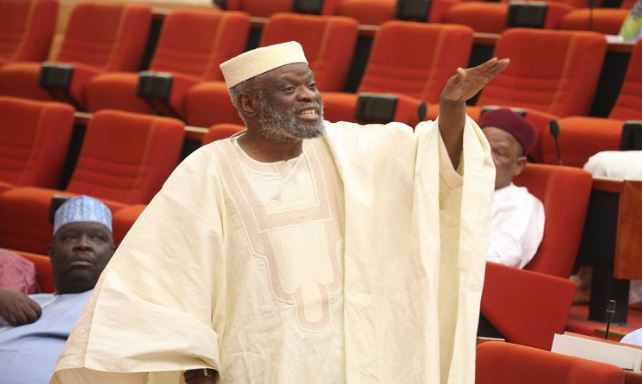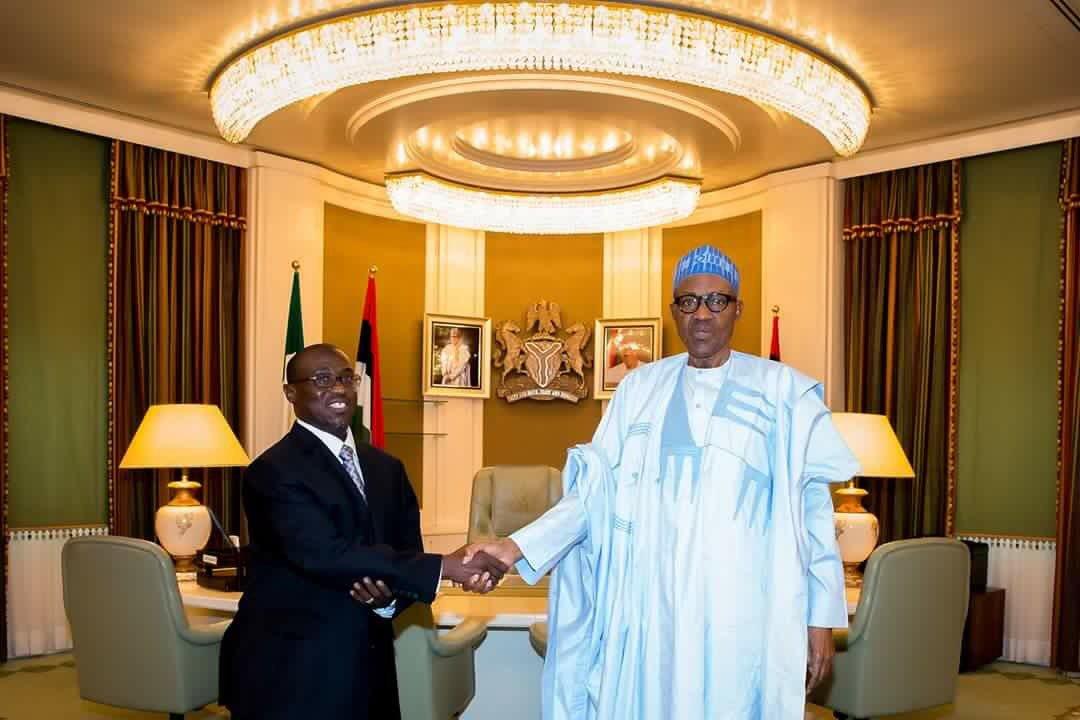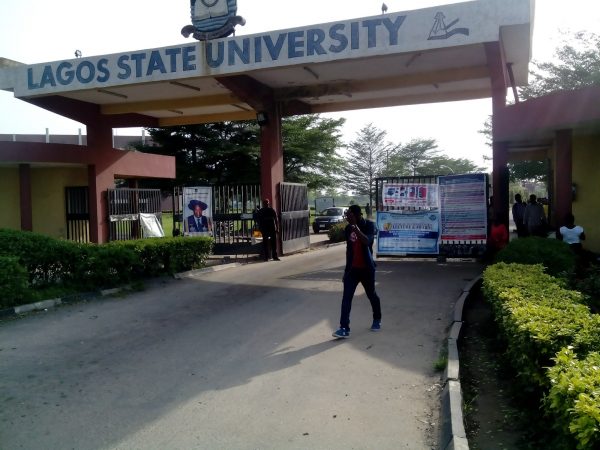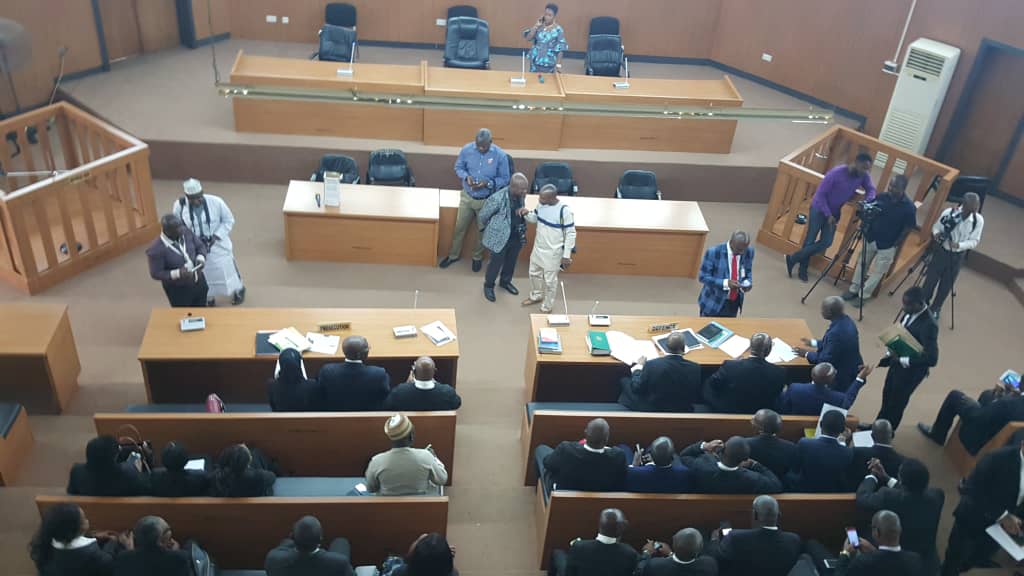Olusola Adeyeye
In the past two weeks a very famous video clip has gone viral. It’s the video of Senator Professor Sola Adeyeye as he waxed philosophical on the floor of the Nigerian Senate. I decided to respond to him for several reasons, notably that Nigerians being very emotional people get carried away with great oratory while ignoring to dig for the truth. And oftentimes, we are satisfied with quoting superstars even if what they propose is unworkable. At the end, such deployment of age-long biases only perpetuates and expands our existing problems as innocent youths are recruited into them.
I note that Senator Adeyeye mentioned that he had been a local government chairman in the Igbomina-speaking area of Osun State. He made the point to emphasise how local people need to take change of running their societies. However, I noted that though he had been a local government chairman and risen through the ranks, all he can do is complain about the issues. Nothing has changed. What then is the value of asking people to go and start their quest for leadership from the local governments? Chances are that his local government is no different today from what it was three decades ago. Here is the distinguished senator – whose wife is also the DG of NAFDAC, complaining about the same issues of which we agonized four decades ago. At some point in the video, perhaps having been heckled by some younger senators, he said he pitied those who were in their 50s because he had since crossed 70. Where will Nigeria’s salvation come from. Is politics all about having one’s run of political career, sorting oneself and one’s family out, and complaining about how nothing changed?
I also noticed something that spoilt the background of Senator Adeyeye’s otherwise masterful oratory; the other senators paid no mind. Senator Lawan’s face showed mild disinterest. Senator Gemade’s face showed undisguised pity. Senator Abba Aji looked on with what could be interpreted as a tinge of disdain, while Senator Shehu Sani and a few others chatted away, exchanged banters and hand slaps etc. This chaotic manner of conduct has become standard fare in Nigeria’s top legislature and may be unchangeable but it is totally disgraceful and a bad example to set for our children, many of whom chance on those sessions on TV. The optics we see is that the Senate is an unserious place. Even primary school classrooms have better decorum. I hope the legislators get the message, or perhaps this is the way we are as a people? Unable to calm down and organize ourselves for progress?
But beyond the usually unruly conduct of the Senate and our general ‘jagajaganess’ in Nigeria, one should consider the substance of Senator Adeyeye’s popular umbrage.
Advertisement
Senator Adeyeye says Nigeria’s constitution is the problem with the country. Is this true? I very much doubt. Usually, lawyers are the ones that think this way, but it is said that if your only tool is a hammer, every problem looks like a nail. Men are not made for laws, but laws for men. It is also said that the more the laws, the more the crime. What we have seen in Nigeria is the unreadiness of men to obey the law. Put men in positions of authority and they immediately rise above the law. Yet, and paradoxically too, we have an unwieldy, expensive national assembly and 36 state assemblies eating the country to death in the name of making laws. Just how much law does a man, or indeed a country, need? I think it is very convenient to blame the country’s problems on an inanimate object that cannot speak for itself – the constitution – while ignoring the role than men played, and continue to play, in getting us here For example, how does our national assembly reform itself? Going the way they are, will we ever have part-time legislature, or do away with one of the arms like other thinking countries are doing? While put an omnibus burden on the constitution while ignoring to solve component parts of the problem and showing example? Meanwhile most of those hailing Adeyeye have not even read the constitution – a constitution which tries to provide for everything under the sun albeit in futility.
In the course of electioneering I went through the 68 exclusive items that have purportedly held Nigeria to the ground. Honestly I couldn’t find up to 10 that needs to be moved to the states. These are items like Road infrastructure, Railway, Prisons, Marriages, Policing, Power generation, most of which some states have found ways to legally circumvent. The vast majority of these items of which Adeyeye speaks to painfully and evokes the emotions of millions of Nigerians must necessarily be federal affairs. I reproduce the items at the end of this article.
Of particular mention is state police. I do believe that Nigeria is now due for state policing but the premise with which we contemplate that movement matters. We shouldn’t seek state police on the platform of amplifying our ‘differences’, but clearly on the basis of efficiency and the need to protect human lives. There is really nothing wrong for a DPO from Benue State to serve in Osun (one of the complaints laid by Adeyeye). We are all Nigerians, and indeed there are times when people who are detached from local politics of a place are able to make unbiased decisions more than sons of the soil who sometimes get swept away in the deluge of history. In the military days, they experimented with governors who were sons of the soil, then chose governors who were outsiders to a state, and some outsiders did infinitely better than sons of the soil. Mind you, local politics can even be dirtier than the national one.
Advertisement
I have an issue with the type of politics that the Adeyeye speech promotes, though I know him having met him casually a couple of times as an energetic, humorous, affective and dedicated individual. Perhaps fatigue is setting it as it usually does for people who grapple for long with our myriad of political problems.
Senator Adeyeye says Nigeria is not practicing federalism. I disagree. When I went in search of the meaning of federalism I discovered two things; one is that there is nothing like true federalism. Internationally federalism is defined by the country which practices it. There is therefore American federalism, Nigerian Federalism, Belgian Federalism, European Union Federalism and so on. I think we have a problem here whereby we interpret social science as pure science. Forget what you read in O’Level government textbooks. Even those countries from where these terminologies emanated are still trying to find their feet. The second thing I discovered was that at the root of American federalism was a disagreement – between the Federalists (John Jay, James Madison and Alex Hamilton) who wrote 85 articles defining the idea of federalism to mean a situation where American states come together as one force to withstand external incursion by Spain, Britain and France – in other words a stringer centre – and guys like Thomas Jefferson who espoused the brand of state independence (weaker centre) being pushed by Adeyeye and many other intellectuals especially from Nigeria’s south today. If Americans can hardly agree on what Federalism should be about, we cannot make a pure science of the matter in Nigeria.
The lesson here is that federalism is exactly what you make of it. Your democracy is what you make of it. The USA did not come to ask us before some of its states vote for their District Attorneys or their DPOs (Sheriffs). It works for them, and so they did it. Nigeria must begin to think of serious elite consensus. All these divisive arguments quoting from expired textbooks will not take us anywhere. In India, they practice asymmetric Federalism whereby some states have more powers than others. Imagine if we suggested that here! We cannot seek more powers for already power-drunk, inefficient and wasteful governors just because a textbook said so. Whatever powers we grant them must come with checks and balances. I would want to see them handle state policing for the simple reason that they will then have to use the security votes which none of them presently account for. Many of them are seeing the trap now and are keeping mum on the subject of state policing.
More importantly, we should be thinking of how to truly empower our local governments by sending our best brains there to work for our people. States do not need more money. Local governments – the very grassroots of Nigeria – need more money. State governors and assemblies may be able to create more local government, but the rest of us must ensure that financing for local government is not based on the sheer whim of undemocratic governors. The next phase of growth for Nigeria actually resides at the local level. So, if our own federalism must have three federating units, I say why not? This also throws up the question of how states evolve. States which evolved as jokes, out of reaction to tribal differences, or as favours for girlfriends are not states in the same sense as the initial 13 British Colonies of Virginia, Pennsylvania, New York, New Jersey, Connecticut, Rhode Island, New Hampshire, Delaware, Massachusetts, Maryland, Georgia and the Carolinas which formed the American union. These territories were basically countries unto themselves before the union. If we must give immense sovereign powers back to ‘states’, it should not be our states as constituted today. Not even the regions. There were no Yoruba, Igbo or Hausa nations with clear territories as well. What we had were thousands of nations and villages. Our evolution as a country by dint of an amalgamation by our colonial overlords cannot be compared with the meeting of equals that wrote the American constitution. It was by fiat. And that fiat has the force of law. What that means is that we need to be careful in claiming rights as the Americans did. For example, the concept of ‘senate’ for example is tied to feudalism, via land ownership. Senators are meant to be barons of sorts, representing their states irrespective of size. In Nigeria we are making barons out of street urchins and agberos. We are making sovereign states out of hurriedly created contraptions which caught the fancy of our military. So, it is wrong to push for more powers for states just because we can. We need to think for Nigeria and her future. We need to think outside the box.
Advertisement
As I wrote this article, I ran into a short story that reminds me of Nigeria more closely, on WhatsApp. It goes:
THE DEMON AND THE HORSE
Please follow the sequence: –
– A horse was tied to a tree;
Advertisement
– A demon came and released him;
– The horse entered the garden of neighboring peasants and started eating everything;
Advertisement
– The wife of the owner of the vegetable garden, when she saw this, took a rifle and killed the horse;
– The owner of the horse saw the dead horse, he became angry, he also took his rifle and shot the farmer’s wife;
Advertisement
– On returning home, the farmer found his wife dead and killed the owner of the horse;
– The children of the owner of the horse, seeing their dead father, burned the farm of the farmer;
Advertisement
-The peasant, in retaliation, killed them all;
– They asked the devil what he had done, and he replied: I did not do anything. I just released the poor horse who was hungry.
The above tells more of our reality today. The British could be the demon. They could claim to have merged us without meaning harm. But in reality, we were basically slaves to the Brits at the time of colonization. To those who like to complain about that reality I say we also took slaves from among ourselves and did all sorts of injustices black on black. Let’s get serious here. You can see from the above story that all sorts of injustices have been meted out against ourselves since the union. The point is where do we stop? Tomorrow morning, some big man in some ministry will take some billions because one man from the other religion or tribe took some money 40 years ago. A man will be murdered by rival tribesmen on his farm somewhere in the forests of Nigeria because his forefather’s kinsman killed someone from the other tribe. The cult members whose friends were beheaded on the streets of Ajah are gearing up for their own counter massacre. Life here is in a flux. Only the truly wise can halt the tide of injustice and violence. Mere rhetoric, no matter how flowery, will not do.
I have always felt and known that what we need are not more guys ‘blowing grammar’ on the floor of the national or state assemblies. If Adeyeye was his true self, he ought to have been declaring his full pay, but Nigeria is one helluva country where the people’s employees lord it over their employers. They ask what is our business with their pay? Who will halt the drift to the abyss really? Certainly not popular oratory. If it was oratory, the talk from the likes of Dino, Shehu Sani and Ben Bruce will have turned Nigeria to El Dorado by now..
Anyhow, please see below the 68 items and tell me how many you can yank off to the states as well as local governments. Do not stretch them though. And also think of operability and what value the reclassification may unleash especially at the State and LG level. If you cannot see this value, best leave the items where they are. As for the governors, for me and my house, most of them stand discredited for now. We don’t need more powers for them, but we need more attention at the LG level.
THE ‘68’ ITEMS ON OUR EXCLUSIVE LIST
- Accounts of the Government of the Federation, and of offices, courts, and authorities thereof, including audit of those accounts.
- Arms, ammunition and explosives.
- Aviation, including airports, safety of aircraft and carriage of passengers and goods by air.
- Awards of national titles of honour, decorations and other dignities.
- Bankruptcy and insolvency
- Banks, banking, bills of exchange and promissory notes.
- Borrowing of moneys within or outside Nigeria for the purposes of the Federation or of any State.
- Census, including the establishment and maintenance of machinery for continuous and universal registration of births and deaths throughout Nigeria.
- Citizenship, naturalization and aliens.
- Commercial and industrial monopolies, combines and trusts.
- Construction, alteration and maintenance of such roads as may be declared by the National Assembly to be Federal trunk roads.
- Control of capital issues.
- Copyright
- Creation of States
- Currency, coinage and legal tender
- Customs and excise duties
- Defense
- Deportation of persons who are not citizens of Nigeria
- Designation of securities in which trust funds may be invested.
- Diplomatic, consular and trade representation.
- Drugs and poisons.
- Election to the offices of President and Vice-President or Governor and Deputy Governor and any other office to which a person may be elected under this Constitution, excluding election to a local government council or any office in such council.
- Evidence
- Exchange control
- Export duties
- External affairs
- Extradition
- Fingerprints identification and criminal records.
- Fishing and fisheries other than fishing and fisheries in rivers, lakes, waterways, ponds and other inland waters within Nigeria.
- Immigration into and emigration from Nigeria
- Implementation of treaties relating to matters on this list
- Incorporation, regulation and winding up of bodies corporate, other than co-operative societies, local government councils and bodies corporate established directly by any Law enacted by a House of Assembly of a State.
- Insurance.
- Labour, including trade unions, industrial relations; conditions, safety and welfare of Labour; industrial disputes; prescribing a national minimum wage for the Federation or any part thereof; and industrial arbitration.
- Legal proceedings between Governments of States or between the Government of the Federation and Government of any State or any other authority or person.
- Maritime shipping and navigation, including –
(a) shipping and navigation on tidal waters;
(b) shipping and navigation on the River Niger and its affluents and on any such other inland waterway as may be designated by the National Assembly to be an international waterway or to be an inter-State waterway;
(c) lighthouses, lightships, beacons and other provisions for the safety of shipping and navigation;
(d) such ports as may be declared by the National Assembly to be Federal ports (including the constitution and powers of port authorities for Federal ports).
- Meteorology
- Military (Army, Navy and Air Force) including any other branch of the armed forces of the Federation.
- Mines and minerals, including oil fields, oil mining, geological surveys and natural gas.
- National parks being such areas in a State as may, with the consent of the Government of that State, be designated by the National Assembly as national parks.
- Nuclear energy
- Passports and visas
- Patents, trademarks, trade or business names, industrial designs and merchandise marks.
- Pensions, gratuities and other-like benefit payable out of the Consolidated Revenue Fund or any other public funds of the Federation.
- Police and other government security services established by law.
- Posts, telegraphs and telephones
- Powers of the National Assembly, and the privileges and immunities of its members
- Prisons
- Professional occupations as may be designated by the National Assembly.
- Public debt of the Federation
- Public holidays.
- Public relations of the Federation
- Public service of the Federation including the settlement of disputes between the Federation and officers of such service.
Quarantine - Railways
- Regulations of political parties
- Service and execution in a State of the civil and criminal processes, judgements, decrees, orders and other decisions of any court of law outside Nigeria or any court of law in Nigeria other than a court of law established by the House of Assembly of that State.
- Stamp duties
- Taxation of incomes, profits and capital gains, except as otherwise prescribed by this Constitution.
- The establishment and regulation of authorities for the Federation or any part thereof –
(a) To promote and enforce the observance of the Fundamental Objectives and Directive Principles contained in this Constitution;
(b) To identify, collect, preserve or generally look after ancient and historical monuments and records and archaeological sites and remains declared by the National Assembly to be of national significance or national importance;
(c) to administer museums and libraries other than museums and libraries established by the Government of a state;
(d) To regulate tourist traffic; and
(e) To prescribe minimum standards of education at all levels.
- The formation, annulment and dissolution of marriages other than marriages under Islamic law and Customary law including matrimonial causes relating thereto.
- Trade and commerce, and in particular –
(a) trade and commerce between Nigeria and other countries including import of commodities into and export of commodities from Nigeria, and trade and commerce between the states;
(b) establishment of a purchasing authority with power to acquire for export or sale in world markets such agricultural produce as may be designated by the National Assembly;
(c) inspection of produce to be exported from Nigeria and the enforcement of grades and standards of quality in respect of produce so inspected;
(d) establishment of a body to prescribe and enforce standards of goods and commodities offered for sale;
(e) control of the prices of goods and commodities designated by the National Assembly as essential goods or commodities; and
(f) registration of business names.
- Traffic on Federal trunk roads.
- Water from such sources as may be declared by the National Assembly to be sources affecting more than one state
- Weights and measures.
- Wireless, broadcasting and television other than broadcasting and television provided by the Government of a state; allocation of wave-lengths for wireless, broadcasting and television transmission.
- Any other matter with respect to which the National Assembly has power to make laws in accordance with the provisions of this Constitution.
- Any matter incidental or supplementary to any matter mentioned elsewhere in this list.
Views expressed by contributors are strictly personal and not of TheCable.







